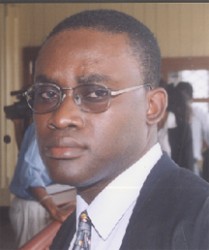Legislation designed to update existing local laws to ensure that they keep pace with the evolution of gaming is currently being drafted and could be completed before the end of this year, Chairman of the new Gaming Authority of Guyana Roysdale Forde has told the Stabroek Business.

Forde, an Attorney-at-Law, who was named Head of the Gaming Authority in April said that the focus of the new legislation would be on bringing all forms of gaming under the ambit of the law. He explained that at the moment legislation governing gaming was limited to casinos and that the focus of new legislation would be “to ensure that gambling, in all of its forms, come under the ambit of the authority.”
Describing the 1902 legislation as insufficient, Forde noted that it took until 2007 to bring amendment to allow for the operations of casinos. The Gambling (Amendment) Act allows for the creation of casino premises and the issuance of a casino operator’s license. The legislation stipulates that “no more than three casino premises licenses” may be issued in respect of any one of the country’s ten regions and limits the issuance of such licenses to new hotel or resort complexes that have “a minimum of one hundred and fifty rooms allocated for accommodation.” Forde conceded that the existing stipulation on the number of hotel rooms that qualify an applicant for casino license to be granted one is one of those laws which, “practically, may have to be revisited.”

Under Section 30 of the 2007 Act, the legislation also stipulates that gambling in a licensed casino is limited to “a paying guest accommodated in a room of the hotel of resort complex in respect of which the casino premises license was issued or any other person or class of
persons authorized by the regulations. Under Section 31 persons contravening the regulations “commit an offence and are liable on summary conviction to a fine of not less than one million dollars and not more than twenty million dollars and imprisonment for a term of not less than six months nor more than two years.”
Forde told Stabroek Business that the upgrading of the country’s gaming laws had become important both from the standpoint of “seeking to facilitate a market that includes tourists and potential tourists and taking advantage of the economic opportunity which the gaming industry offers. Of course it is also important that we ensure that gaming itself does not drift outside of the regulations that exist and, as well, that we remain mindful of the implications of gaming for ensuring that we stay within the ambit of what, these days, are serious anti-money laundering considerations.”
In 2009, the Gaming Authority issued a licence to a company registered as the Georgetown Investment and Management Services Inc for the establishment of a casino to the former Princess Hotel.
Over the years, there has been sporadic public objection from members of the religious community who contend that the society has become increasingly comfortable with legalized gambling notwithstanding the serious negative societal consequences associated with the practice. Forde told Stabroek Business, however, that while the Authority was not unmindful of the social considerations “the fact of the matter is that the mores of the society have shifted significantly as far as gaming is concerned. Gaming has definitely become more socially acceptable as time has gone by,” he added.
Forde said that the body will be seeking the resources to ensure that the laws governing gaming are effectively enforced. “One of our concerns, obviously, is with seeking to protect minors from access to legalized gaming,” he said.
Asked to provide critical details of the focus of the draft new legislation Forde said that he thought it was “premature” to do so. “What I can tell you, however, is that what the law will be seeking to do, among other things, is to bring those forms of gaming like online gambling and sports betting that currently not regulated under the Gambling Prevention Act into line. It is a matter of ensuring that all gaming enterprises comply with the law.”
Forde said the Gaming Authority faced a challenge with the adequate financing of its agenda but that part of the focus of the legislation was on creating an operating framework that would enable the garnering of revenue for that purpose.




